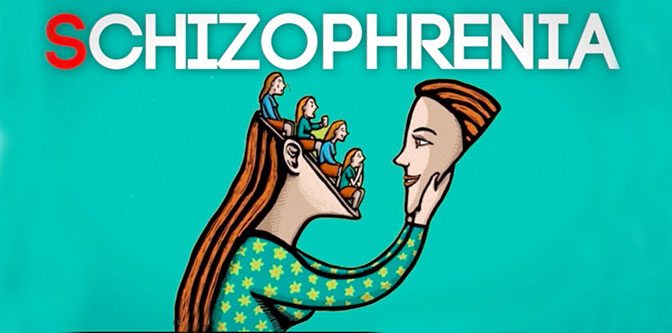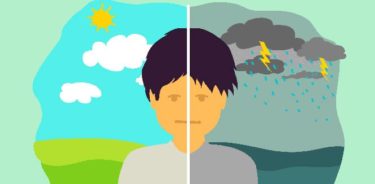Schizophrenia is a complicated brain disease which lasts for a life time, but also can be kept under control via an effective treatment. Genetical susceptibility, cognitive and environmental factors can create schizophrenia. Schizophrenia patients may seem detached from reality, hear voices or see things which do not exist, or think that someone will try to hurt them. Symptoms can change depending on the type and also can have some individual differences. Some patients can become much introverted whereas some others become more active and sociable. An effective treatment can reduce symptoms and make patients function again in daily routine.
Table of Contents
What is schizophrenia?
Schizophrenia is a complicated and serious brain disease which causes dysfunctions in brain, deviations in thoughts, hallucinations, becoming severely introvert, having decrease in motivation and difficulties in concentration. It is not as rare as it is considered. It can affect 0.5% of the populations and have different effects on people depending on its type. Schizophrenia symptoms start usually between the ages of 16 and 30. Rarely, first symptoms can be seen in children and the people over age 45.
Its prevalence is equal among men and women. However, it can start in later ages in men. Schizophrenia usually starts slowly, and its symptoms become obvious by time. Causes of schizophrenia are not certain yet; however, experts consider genetical, cognitive and environmental factors together as a cause.
Schizophrenia can impair people’s daily routine such as interacting with people, studying or working. However, treatment methods are improving, and thanks to them, people can increase their functioning significantly. Contrary to common arguments, schizophrenia patients are not offensive, aggressive or dangerous. Early diagnosis and effective treatment can provide patients with a high-quality life. Psychotherapies and psychosocial interventions are essential in treatment as well as medications.

Causes and risk factors
- Problems in brain chemicals, especially in dopamine and glutamate
- Genetic susceptibility – Having family members with schizophrenia
- Being exposed to certain viruses
- Insufficient nutrition in prenatal period
- Early labor or low birth weight
- Complications during birth such as asphyxia
- Increased immune system responses – Autoimmune diseases in which body attacks to its own tissues
- Using psychoactive and psychotropic drugs in adolescence and young adulthood
- Drug abuse
- Traumatic life events such as grief; divorce; loss of job, home or a relationship; physical, emotional or sexual abuse
In contrast to popular views, schizophrenia is not caused by something that people or their families did or did not in the past. Schizophrenia is not a punishment method for people. These views have no scientific base, and they cause stigmatization of people with schizophrenia. Schizophrenia occurs by a combination of several risk factors.
None of these factors can cause schizophrenia separately. Some can create a susceptibility whereas some others can trigger the disease. Schizophrenia has no relation with a low or a high intelligence.
Symptoms of Schizophrenia
- Chronic difficulty in sleeping and concentration
- Inappropriate behaviors in social occasions
- Having an enduring angry and scary attitude towards close ones
- Speaking, thinking and writing in a peculiar way
- Hallucinations
- Having the sense of being stalked all the time
- Withdrawal from social environments, social isolation
- Decreasing success in school or work
- Changes in personality
- Being indifferent to important events
Schizophrenia usually occurs with these symptoms. It does not occur suddenly, rather, it develops slowly. Symptoms of schizophrenia are divided into 5 groups by experts:
Delusions
False beliefs which are completely disconnected to reality. Believing that everyone is in love with you, some people on the street are trying to send a message to you, someone is trying to hurt you or steal your ideas are the most common delusions.
People can continue to believe delusions even after they are proven to be false and unreal. While evaluating the delusions’ connection to reality, it is important to consider people’s culture, religion and educational backgrounds.
Hallucinations
Seeing non-existent things and hearing non-existent voices. Sometimes, they can be confused with delusions. Hallucinations are related to senses whereas delusions are related to thoughts. For people with schizophrenia, it is almost impossible to distinguish reality and hallucinations. Hallucinations can be about all five senses, yet the most common one is hearing the non-existent voices.
Distortions in thoughts
Having complicated thoughts, or switching easily between topics. People can have difficulties while watching TV, reading newspaper or talking to someone. People with schizophrenia name this condition as having foggy and blurry thoughts.
Disorganized behaviors
Behaviors can show many changes in many directions. Usually, behaviors lose their focus and people start to have difficulties in finishing their tasks. Some patients can have a childish mood whereas some others have completely a motionless mood or a meaningless overactivity state.
Negative symptoms
Symptoms being positive or negative is related to whether disease brings something to patient or take something away. Delusions, hallucinations, changes and distortions in thoughts and behaviors are positive symptoms since the disease creates them.
Negative symptoms, on the other hand, are that patients lose some functions and features. They can lose their interest to life or live events, have difficulties in sleeping or concentrating, withdraw themselves from social activities and become isolated.
Diagnosis of Schizophrenia
If you think that you or your close ones have these symptoms, it is crucial to see a doctor as soon as possible. Early diagnosis and treatment are very important and effective to reduce schizophrenia symptoms and increase people’s functioning.
There is no single way to diagnose schizophrenia. To determine the diagnosis, a psychologist or a psychiatrist can ask some questions regarding your symptoms, your childhood and/or adolescence, and your family. After this stage, they can examine whether you have another physical or psychological disease or not since sometimes brain tumors or psychological disorders such as post-traumatic stress disorder can have symptoms similar to schizophrenia symptoms.
To eliminate this possibility, experts can apply physical examination, brain imaging techniques, psychiatric evaluation, and they can compare symptoms to diagnostic criteria.
Types of schizophrenia
Schizophrenia has several types. Symptoms and development of disease can change depending on these types.
What is paranoid schizophrenia?
People with paranoid schizophrenia have intense delusions and hallucinations. They usually tend to deny the disease and hide the symptoms; therefore, they become isolated. They can think that they are under a severe threat, they will be tortured, punished, or murdered. Scepticism is common. Sometimes, some thoughts may have a realistic base even if they are presented with some hallucinations. Paranoid schizophrenia starts later and develop more slowly compared to other types.
What is hebephrenic (disorganized) schizophrenia?
Hebephrenic schizophrenia patients’ minds are confused and inconsistent. They may have incoherent or chaotic speech. Their behaviors may seem emotionless, superficial, inappropriate or childish. They can have difficulty in taking shower or preparing meal because of their disorganized behaviors.
What is catatonic schizophrenia?
People with catatonic schizophrenia are usually indifferent to outer world. They can stay in a certain position for hours and do not react to other people. They may grimace, have unusual sitting positions, repeat what others say, or react oppositely to others.
Catatonic schizophrenia usually starts suddenly in adolescence or young adulthood. Patients may have insufficient nutrition, exhaustion or self-injuring behaviors.
What is undifferentiated schizophrenia?
In this type, people have psychosis; yet, symptoms either cannot be included in any subtype of schizophrenia, or cannot meet their criteria.
What is residual schizophrenia?
This type is the state where people do not have many positive symptoms, but still have considerable amount of negative symptoms such as isolation, lack of movement, or emotional blunting.
What is post-schizophrenic depression?
This type occurs after that schizophrenia symptoms and severity decrease significantly. People can experience a chronic over-fatigue and depression. In order to differentiate post-schizophrenic depression and residual schizophrenia, medical history is used.
What is simple schizophrenia?
It is a difficult type to detect since almost no positive symptom is present. Usually, people experience just negative symptoms. It can be detected by using medical history.
Treatment of schizophrenia
Since causes of schizophrenia are not well-known, treatment usually aims to diminish symptoms or reduce them as much as possible to carry people’s functioning to normal levels. Medications are preferred to treat positive symptoms such as delusions or hallucinations whereas psychotherapies and psychosocial support methods are applied to reduce negative symptoms.
Is there a treatment for schizophrenia?
A certain treatment for schizophrenia has not been found yet. However, medications and psychological treatments are effective to decrease the effect of disease, and to make people go back to their daily routines. Current treatments help reducing many symptoms. Sometimes people may need to use several medications with several different doses in order to determine what is the best option for them.
Therefore, you should take medications which your doctor prescribed in right doses, and consult your doctor in case of any unexpected side effect. Moreover, attending psychotherapies and psychosocial interventions such as educations for families, skill training or rehabilitation is really essential to reduce effects of negative symptoms, to break the stigmatization and to increase the psychological well-being of patients.
Medication treatments in schizophrenia
Antipsychotics
This is the most frequently prescribed medication group for treatment of schizophrenia. It is considered to be effective because if affects neurotransmitters in brain. It aims to prevent psychosis. Some side effects may occur in first few uses; but, they will diminish by time.
Side effects of antipsychotics
- Blurry vision and weakening sight
- Uncontrollable body movements
- Dizziness
- Lethargy
- Racing heart beat
- Irritability
- Menstrual problems
- Over-sensitivity to sun
- Skin rashes
- Hardening body parts
Antipsychotics can cause diabetes, high cholesterol, weight gain or lack of control the muscles around mouth. At this point, you should remember that people can react differently to these medications and you should definitely inform your doctor about these effects.
Determining the right medication and right dose can take some time. Your doctor can suggest you to try different medications for different doses. These using medication and cessation processes should be done under your doctor’s consultation. Quitting a medication without the consent of your doctor can increase severity of schizophrenia, and worsen the symptoms.
Psychotherapy and psychosocial support for schizophrenia
Currently, medications can be effective in only reducing positive symptoms. To make patients function properly again, continue to work or go back to their social lives in confidence, psychotherapies and psychosocial support mechanisms are crucial.
Psychotherapy
In treatment process of schizophrenia, patients should also have psychotherapy. Psychotherapy facilitates people’s coping with both disease and effects of disease. It provides patients with an awareness of themselves and the disease. Therefore, people can understand the early signals of disease, evaluate them and prevent possible relapses. People who have a regular psychotherapy have more positive outcomes in treatment.
Cognitive behavioral therapy (CBT) is one of the most common approaches used in schizophrenia treatment. It helps people notice, evaluate and change the unhelpful thought and behavior patterns. Sometimes, people can tend to use alcohol or unprescribed medications. In these cases, therapy can include additional methods to quit these behaviors.
Psychosocial support methods
- Education for families: Family support is crucial for treatment of schizophrenia. Education programs for families are useful for both patients and families since families can learn how to cope with stigmatization or how to support patients’ treatment processes.
- Skills trainings and rehabilitation: These programs aim to make patients gain successful coping mechanisms. Patients can learn how to cope with social isolation, difficulty in interaction, or stigmatization. These programs are also useful for patients to develop daily life skills to find a job or to go to school.
- Support groups: These are the meetings that patients and their family members -usually separately- come together and share their experiences regarding development of disease, coping with daily hassles or symptoms. These meetings are important especially because they give a realistic hope to recently diagnosed patients and their families about the future processes. Both patients and families can learn new useful methods from these meetings.
Tips for schizophrenia patients and their close ones
- Don’t feel embarrassed because of disease: Schizophrenia is a brain disease which may affect every person and occurs by a combination of various reasons. It is not a kind of punishment due to something that patients or their families did or did not in the past. Trying to hide disease may make people feel worse, and affect the treatment negatively. These behaviors can cause difficulties for patient to go back their social lives.
- Adhere to treatment: Schizophrenia treatment requires inclusion of families, too. Supporting the patient in treatment, reviewing home-related processes, being more sensitive in relationships and sharing a psychological support are important for the sake of therapy.
- Learn the schizophrenia: Schizophrenia is a disease with lots of myths, yet is not well-known by people. Do not believe all what you hear about schizophrenia; instead, search for it from reliable sources. You can consult your doctor or associations for these sources.
- Attend a support group: Schizophrenia treatment requires a long process, much effort and discipline. Sometimes, patients may want to quit treatment since they get tired or lose their hope. Support groups are useful to remind patients that they are not alone. People share their experiences, effective coping mechanisms, and realistic hopes in these meetings.
- Do sports and socialize: Sports and social activities affect treatment process positively. Trekking, having short walks, even small physical exercises can be good for a start. Also, going to cinema or theatre would be beneficial for both patients and their close ones.
- Learn how to alleviate stress and relax: Both disease and treatment can have separate difficulties for patients and families. In order to cope with these, yoga and meditation would be beneficial.
Remember! You are not alone. Schizophrenia is more common than it is considered to be. Do not let stigmatization discourage you. Adhere to treatment, do not get withdrawn from social life and do not hesitate to ask for support when you need. You can always consult your doctor or schizophrenia associations for more detailed information.



